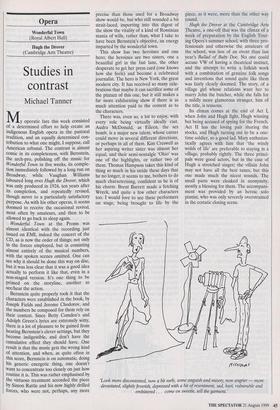Opera
Wonderful Town (Royal Albert Hall) Hugh the Drover (Cambridge Arts Theatre)
Studies in contrast
Michael Tanner
My operatic fare this week consisted of a determined effort to help create an indigenous English opera in the pastoral tradition, and an equally determined con- tribution to what one might, I suppose, call American urbanal. The contrast is almost comic in its completeness, with Bernstein, the arch-pro, polishing off the music for Wonderful Town in five weeks, its comple- tion immediately followed by a long run on Broadway, while Vaughan Williams laboured long over Hugh the Drover, which was only produced in 1924, ten years after its completion, and repeatedly revised, though never to a particularly satisfactory purpose. As with his other operas, it seems doomed to receive the occasional revival, most often by amateurs, and then to be allowed to go back to sleep again.
Wonderful Town at the Proms was almost identical with the recording just issued on EMI, indeed the concert of the CD, as is now the order of things; not only in the forces employed, but in consisting almost entirely of the musical numbers, with the spoken scenes omitted. One can see why it should be done this way on disc, but it was less clear that it was a good idea actually to perform it like that, even in a non-staged version. It's one thing to be primed on the storyline, another to see/hear the action.
Bernstein quite properly took it that the characters were established in the book, by Joseph Fields and Jerome Chodorov, and the numbers he composed for them rely on their context. Since Betty Comden's and Adolph Green's lyrics are extremely witty, there is a lot of pleasure to be gained from hearing Bernstein's clever settings, but they become indigestible, and don't have the cumulative effect they should have. One result is that the music gets the wrong kind of attention, and when, as quite often in this score, Bernstein is on automatic, doing his generic energetic thing, one doesn't want to concentrate too closely on just how routine it is. This was rather emphasised by the virtuoso treatment accorded the piece by Simon Rattle and his now highly drilled forces, who were not, perhaps, any more precise than those used for a Broadway show would be, but who still sounded a bit strait-laced, importing into this digest of the show the vitality of a kind of Rossinian mania of wills, rather than, what I take to have been Bernstein's objective, an energy imparted by the wonderful town.
This show has two heroines and one hero; the heroines are two sisters, one a beautiful girl in the fast lane, the other desperate to get her press card (one knows how she feels) and become a celebrated journalist. The hero is New York, the great modern city. It has received so many cele- brations that maybe it can sacrifice some of the pizzazz of this one, but it still makes a far more exhilarating show if there is as much attention paid to the context as to the characters.
There was, even so, a lot to enjoy, with every role being virtually ideally cast. Audra McDonald, as Eileen, the sex bomb, is a major new talent, whose career could move in several different directions, or perhaps in all of them. Kim Creswell as her aspiring writer sister was almost her equal, and their semi-nostalgic 'Ohio' was one of the highlights, or rather two of them. Thomas Hampson takes this kind of thing so much in his stride these days that he no longer, it seems to me, bothers to do much characterising, confident as he is of his charm. Brent Barrett made a fetching Wreck, and quite a few other characters too. I would love to see these performers on stage, being brought to life by the piece, as it were, more than the other way round.
Hugh the Drover at the Cambridge Arts Theatre, a one-off that was the climax of a week of preparation by the English Tour- ing Opera's summer school, with three pro- fessionals and otherwise the amateurs of the school, was less of an event than last year's Ballad of Baby Doe. No one could accuse VW of having a theatrical instinct, and the attempt to write a folkish work with a combination of genuine folk songs and inventions that sound quite like them was fairly clearly doomed. The story, of a village girl whose relations want her to marry John the butcher, while she falls for a mildly more glamorous stranger, him of the title, is tenuous.
Its climax comes at the end of Act I, when John and Hugh fight, Hugh winning but being accused of spying for the French. Act II has the loving pair sharing the stocks, and Hugh turning out to be a one- time soldier, so a good lad. Mary enthusias- tically agrees with him that 'the windy wolds of life' are preferable to staying in a village, probably rightly. The three princi- pals were good actors, but in the case of Hugh a stretched singer; the villain John may not have all the best tunes, but this one made much the nicest sounds. The small parts were cloaked in anonymity, mostly a blessing for them. The accompani- ment was provided by an heroic solo pianist, who was only severely overstrained in the ecstatic closing scene.
`Look more discontented, now a bit surly, some anguish and misery, now angrier — more devastated, slightly feverish, depressed with a bit of resentment, sad, hurt, vulnerable and embittered . . come on sweetie, sell the garment.'


























































 Previous page
Previous page